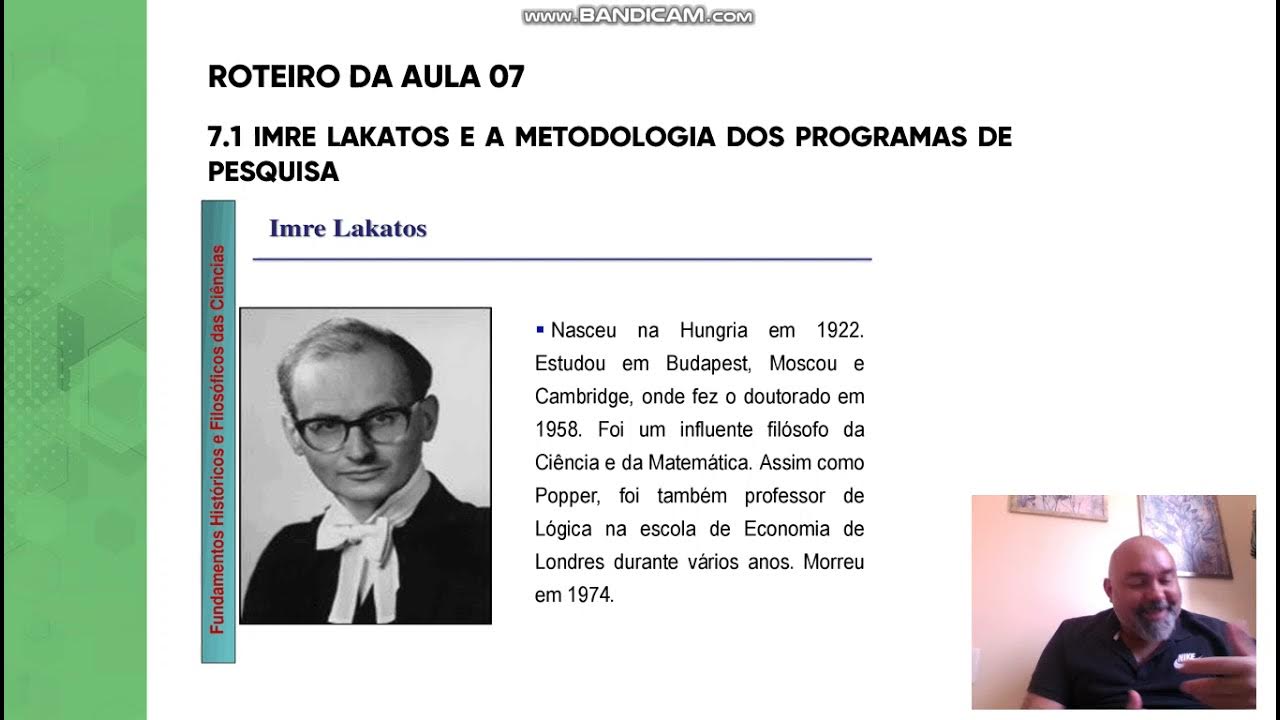criterio de demarcacion popper kuhn lakatos feyerabend
Summary
TLDRThe video explores the philosophical distinctions between science and non-science, focusing on key figures like Karl Popper, Thomas Kuhn, Imre Lakatos, and Paul Feyerabend. Popper emphasizes falsifiability as a cornerstone of scientific theories, critiquing inductive reasoning. Kuhn introduces the concept of paradigms and the importance of subjective factors in scientific progress, while Lakatos offers a methodology that views theories as interconnected. Feyerabend advocates for a pluralistic approach, arguing that diverse perspectives enhance scientific inquiry. Together, these thinkers illustrate the ongoing evolution of scientific philosophy and the debates surrounding the best methods for establishing knowledge.
Takeaways
- 🧠 Popper's criterion of demarcation distinguishes science from non-science based on falsifiability rather than induction.
- 🌅 The example of the sun rising illustrates the limitations of inductive reasoning; past observations do not guarantee future occurrences.
- 🔍 Kuhn proposes that scientific progress occurs through paradigm shifts rather than linear development.
- 📚 In 'The Structure of Scientific Revolutions,' Kuhn argues that scientific knowledge is shaped by historical context and existing frameworks.
- 🔗 Lakatos introduces the concept of research programs, where theories are interconnected and judged within their broader context.
- 🛡️ A robust theory is protected by auxiliary hypotheses, making it difficult to discard a theory without considering the entire program.
- 📜 Feyerabend advocates for a pluralistic approach to scientific methodology, arguing against a single dominant method.
- 🎨 Emphasizing creativity, Feyerabend believes that diverse methodologies foster true scientific advancement.
- 🔄 Each philosopher presents unique perspectives on scientific inquiry, reflecting the evolving nature of scientific philosophy.
- 🌐 The ongoing discourse highlights the importance of flexibility, creativity, and historical context in scientific exploration.
Q & A
What is the main focus of the transcript?
-The transcript discusses the distinction between science and non-science, exploring philosophical perspectives on scientific methodology, particularly those of Karl Popper, Thomas Kuhn, Imre Lakatos, and Paul Feyerabend.
Who is Karl Popper, and what is his key contribution to the philosophy of science?
-Karl Popper was a philosopher and professor known for introducing the principle of demarcation, which asserts that science is distinguished from non-science by its reliance on falsifiability rather than induction.
What is the problem with induction as explained in the transcript?
-The problem with induction is that it does not guarantee certainty in predictions; for example, just because the sun rises every day does not mean it will rise tomorrow.
How does Thomas Kuhn's view of scientific progress differ from Popper's?
-Thomas Kuhn proposed that scientific progress occurs through paradigm shifts, where existing theories are replaced by new frameworks, contrasting with Popper's view that science advances through the falsification of hypotheses.
What does the term 'paradigm' mean in the context of Kuhn's philosophy?
-In Kuhn's philosophy, a 'paradigm' refers to a set of practices, standards, and theories that define a scientific discipline at a particular point in time, shaping how scientists understand and investigate the world.
What is Imre Lakatos's contribution to the philosophy of science?
-Imre Lakatos developed a methodology that integrates ideas from Popper and Kuhn, proposing that scientific theories exist within interconnected research programs, which evolve and are protected by auxiliary hypotheses.
How does Lakatos's methodology help in evaluating scientific theories?
-Lakatos's methodology allows for a holistic evaluation of scientific theories by considering the entire research program rather than isolated theories, making it easier to defend core ideas against refutation.
What is Paul Feyerabend's perspective on scientific methodology?
-Paul Feyerabend advocated for methodological pluralism, arguing that a variety of methodologies should be employed in science to promote exploration and advancement, rather than adhering strictly to a single scientific method.
Why does Feyerabend believe that multiple perspectives are beneficial for science?
-Feyerabend believes that embracing multiple perspectives fosters genuine scientific progress, as it allows for diverse exploration and understanding, leading to a more comprehensive view of knowledge.
How do the ideas presented in the transcript reflect the evolving nature of scientific inquiry?
-The ideas reflect an ongoing dialogue among philosophers that challenges traditional views of scientific methodology, illustrating how theories and approaches are continually reassessed and refined in the pursuit of knowledge.
Outlines

Cette section est réservée aux utilisateurs payants. Améliorez votre compte pour accéder à cette section.
Améliorer maintenantMindmap

Cette section est réservée aux utilisateurs payants. Améliorez votre compte pour accéder à cette section.
Améliorer maintenantKeywords

Cette section est réservée aux utilisateurs payants. Améliorez votre compte pour accéder à cette section.
Améliorer maintenantHighlights

Cette section est réservée aux utilisateurs payants. Améliorez votre compte pour accéder à cette section.
Améliorer maintenantTranscripts

Cette section est réservée aux utilisateurs payants. Améliorez votre compte pour accéder à cette section.
Améliorer maintenantVoir Plus de Vidéos Connexes

KUHN VS POPPER | Paradigm | Falsification

A ciência se organiza em programas de pesquisa? | O que é ciência afinal? 03

Paul Feyerabend, l'anti-méthode scientifique ? (2/2)

Aula 07 Unidade 2 prof Davi Almeida parte 1

Kuhn, Popper y Feyerabend: La Guerra de las Ideas 🪖[Paradigmas de la Investigación]

Post-Positivism as a Philosophy of Research
5.0 / 5 (0 votes)
